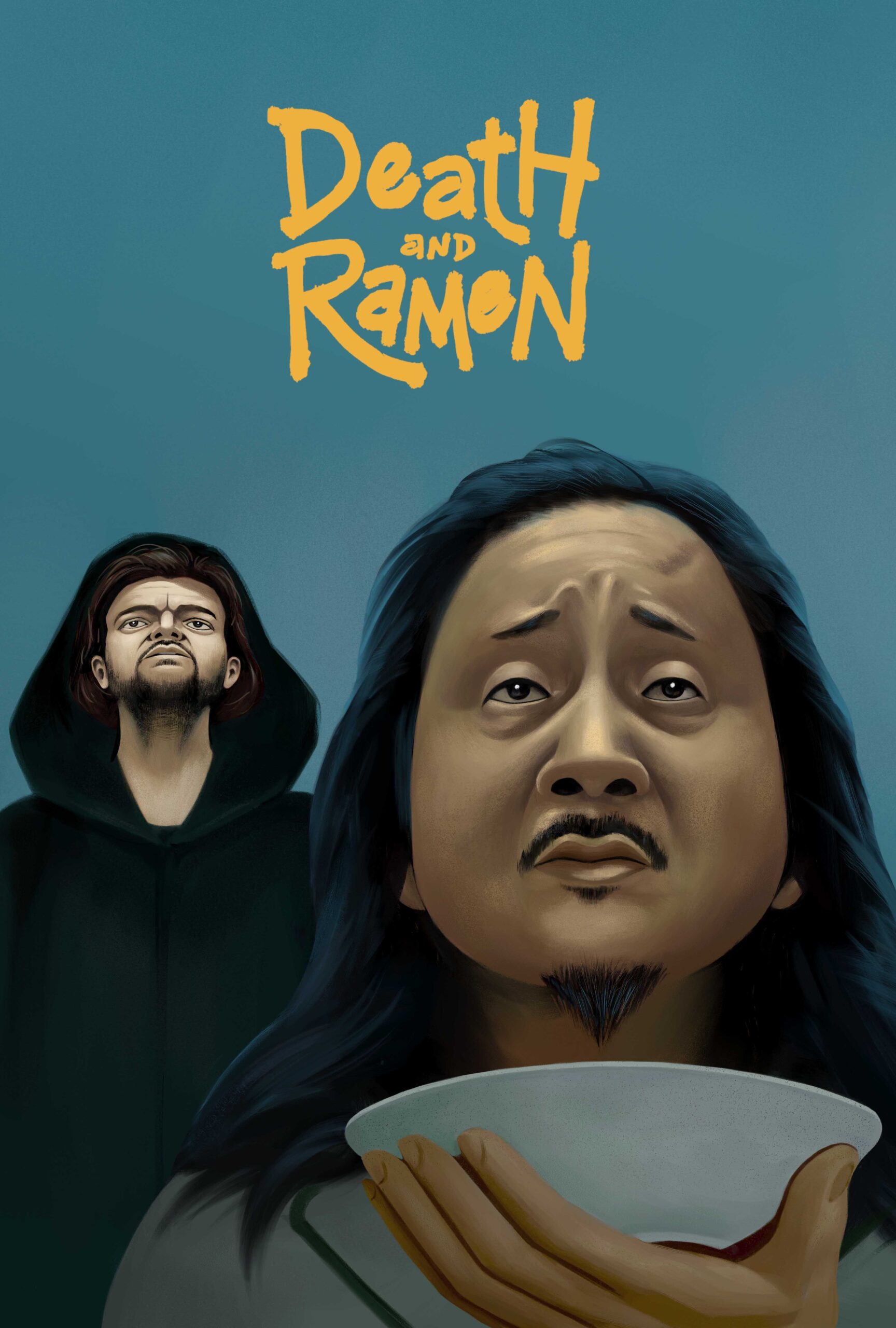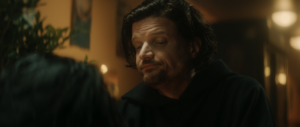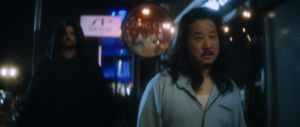
PSISF 2023 Short Film Review “Death And Ramen”
WATCH THE TRAILER HERE
First, the Recap:
Any last requests? When the circumstances find us at the end, this is a query we’ve oft heard associated with having to consider what we might wish to experience before everything arrives at its inevitable close. More specifically, a final meal as an example. Yes, this really seems to equate more to being on Death Row, but what if it applied to a final choice we’re making of our own accord when deciding that the current misery we’re in needs to stop? Timmy (Bobby Lee), a ramen chef who’s now made a drastic decision to assuage an undisclosed grief he’s no longer willing to tolerate, finds that the world may NOT quite be ready to let him go when his attempt is interrupted by poor execution, resulting in an encounter with Death (Matt Jones) and the subsequent lessons in what it is to BE human that ensue. Will this unexpected bond end up causing both of them to learn more than they ever would have anticipated?
Next, my Mind:
It’s comedic, it’s dramatic, it’s dark, yet almost hauntingly cathartic in its ultimate messages about what it is to face our own fate paired with the stirring realities of realizing and appreciating simply being ALIVE and THERE for those whom we treasure while pursuing what drives us to the best places of fulfillment that forms the core gist of this 14-minute indie short film from writer/director/producer/editor Tiger Ji, producers Scott Aharoni, Sinan Eczacibasi, Peter Gold, and Sam Kaminer along with executive producers Bobby Lee, Matt Jones, Bryant Hammond, Austin Herring, Mustafa Kaymak, Mahesh J. Madhav, Mickey Raymond, Jonathan Sanger, Ed Tommasi, Lexx Truss, Wesley Wang, Alice Wells, Kate Xiong, David Ji, Naader Banki, Rebecca Poon, Zhao Mengshan, and Matthew Rapini that will have its official in-person World Premiere screening June 22 at the 2023 Palm Springs International ShortsFest which runs in full June 20-26.
Combine an ode to Mitchell Leisen with a little Martin Brest, shaken then stirred, cut out the romance, and we discover this narrative which focuses on a lonely and emotionally bereft expert ramen chef who’s deemed it’s about time to check out of this world and is intent on making it so. But, when the objective gets surprisingly upended, he now finds himself being granted one last set of moments to become chef, teacher, son, and finally spirit thanks to an interaction with the Master Specter himself, Death, who takes a sudden, if somewhat humorously forced, interest in learning what it truly is to BE one of us. From this point, it is the clever and well-written mix of sometimes edgy, sometimes slapstick, sometimes dry/wry wit filtered through the lens of a highly serious, oft hard to talk about underlying theme. The notions of choke holds, cooking for someone, unions, loneliness, reconciliation, our desire to be remembered, and what comes after it’s all said and done get excellently, poignantly explored through the course of the film.
Additionally, the genuine awareness and comprehension of existence, the curiosity it piques when viewed by an eternal being, is a facet of this narrative that I feel carries even more weight in that it should ideally make US be willing to pause and consider what we take for granted, revisit the fascination WITH who we are as human beings (which was so effectively portrayed here with Death), rediscover the worth of memory, ponder the ties to our past that should have more significance to us again, and know that TIME is a FLEETING thing that should NOT be squandered. One could argue that the lead character’s rather abrupt and disheartening choice of HOW he reaches these places of revelation while also offering the experience of living to Death isn’t the most positive, but again, this critic feels it is more an awareness-raising effort that chooses to use a rather quirky path to make its points while being able to allow us to laugh along the way. It is by no means a disrespect of the tragedy of suicide and the need for prevention.
This all culminates in what ends up being a deeply touching series of moments for the odd pairing, certainly giving us a slightly new twist on the concepts of embracing and dancing with Death, but it also provides a uniquely beautiful idea of the afterlife that just FITS the film’s purposes. Despite his impressive resumé of films and TV appearances, my familiarity with Lee primarily stemmed from his turn as Jin Jeong on the new incarnation of “Magnum P.I.”, so to have the opportunity to see him again was already a guaranteed pleasure and once more he does not disappoint via his role here as Timmy, a ramen chef making a choice to exit the world in a fit of despair. But, when this plan gets summarily foiled by, well, his OWN mistake, Timmy gets an opportunity not to AVOID his time, but to gain the ability to set some things right and have a blast teaching Death himself a thing or two about what’s what on this Earth.
What I admire is the fluidity through which Lee ebbs and flows between utter comedic mayhem and touching drama (plus a little energetic exasperation, too!) providing us the laughs we’re are expecting from him yet being able to recognize that he DOES have more subdued/understated skills as well, which here greatly enhances Timmy’s overall experience he’s enduring, especially when the finale arrives and it’s sheer release and elation. A fully admirable performance through and through. After that lauding, we will NOT be forgetting in ANY form our other primary player here, since the character he embodies is one I absolutely loved to–ok, ok, I won’t say it. Jones exudes such a perfectly suited air of ambivalence, then all-encompassing inquisitiveness, then sense of wonder which he so smartly infuses into the character of Death, appearing this night to claim his latest ward and carry him to the other side–or so he believes.
When his quarry has a rather ungracious re-awakening, to Death’s shock, the initial reaction he has is to–rectify–the situation (which is a TOTAL riot!) but in failing this, soon becomes immersed in wishing to be taught about humanity and the enigma that being alive. While also explaining a little about his own duties to Timmy as well, Death finds particular indulgences and instances to be such inspired encounters, and his own awakening in many respects is just as profound as Timmy’s ability to grant him the chances to know more about us as people. Jones deftly utilizes physical and deadpan humor as well as body language and facial expression to wonderful degrees here as well as providing those necessary moments of dramatic flair that befit the narrative’s course. The sole supporting role here arrives through Karen Yum as Timmy’s Umma, and while it may be some very brief screen time, it is so integral to the story’s plot and the catalyst for a truly moving sequence.
So, in total, “Death And Ramen” adeptly tows the dramedy line, doing so with a tone and perspectives that very much pay that awareness-inducing respect to its initial foundational themes but then allow for the more jovial aspects of events to temper the solemness so we can sit back and be entertained, but also be delivered a compelling tale of what it is to live, to cherish what we have in new ways, and realize that whenever our time might be, there can be HOPE in the release and an eternal celebration to anticipate, with the memory of who we were never to fade away.
As always, this is all for your consideration and comment. Until next time, thank you for reading!





